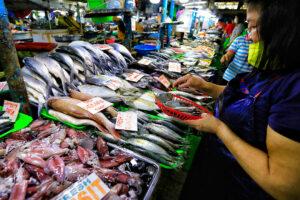OFWs as a permanent phenomenon: Bringing them home

(Part 2)
A moral challenge to many countries in the First World, ostensibly in the United States, is the prevalence of consumerism, a manifestation of materialism. Some moral philosophers consider consumerism as worse than the atheism of the communists or other materialists. At least, practitioners of materialism are consistent with their beliefs. They do not believe in the existence of a personal God or of the spirit. Thus, they behave accordingly and live as if they cease to exist when they die and therefore, look for their fulfillment and happiness in the material things of this world. In contrast, many of the consumerists allege that they believe in God and in a life hereafter. But they act as if everything that matters is acquiring more and more material goods. They equate human fulfillment or happiness with ever accumulating more and more goods to consume. They are obsessed with “having” rather than with “being.”
There is a serious danger that the children of the OFWs are being programmed to be consumerists. The biological parents are being replaced with material possessions, such as the money and goods that the OFWs provide for their families back home to compensate for their absence. Research has shown that those who have been ensnared by a materialistic lifestyle have decreased well-being, consisting of low levels of psychological adjustment and social functioning. Furthermore, more materialistic children and adolescents are less motivated to learn and have less interest in school.
Parental authority is easily eroded among the children of OFWs. They do not give the appropriate respect and attention to their OFW parents as their absence allows their children to look for figures or objects to satisfy the immediate love and support they need as growing human beings. This lack of emotional and moral support will eventually have serious negative effects on the child’s welfare. There are studies which show that the continual separation from their parents and their feeling of having been abandoned could cause conflicts in future reunions and result in a care deficit among adolescents. Although parents often ask the help of relatives to care for their children and the availability of technological applications such as Facebook or Zoom make communication online easier, this mode of interaction falls short of the physical and emotional relationships required between a parent and a child. Eventually, these children would be less socially integrated in their community as adults as they become more selfish and develop a poor work ethic — defects that in a normal family with both parents present are readily corrected at home and in school (in coordination with the parents).
According to the eminent sociologist Talcott Parson, families have assigned gender roles to help with the child’s formation: “While men take on the ‘instrumental role,’ providing financial support, women take on the ‘expressive role,’ ensuring that the emotional needs of the children and husband are met.”
To the extent possible, the government policy regarding OFWs must be geared towards keeping Filipino families intact, with both father and mother physically present in the upbringing of children. One obvious solution is to focus on sending the younger members of the families who are still unmarried as OFWs, to avoid parent absenteeism. Data I obtained from a leading practitioner of ethical recruiting, EDI-Staffbuilders International, is encouraging. Of 382 Filipino nurses the company sent to a European country, 80% are female, of which 58% are single. Of these 382 nurses, 87% are in their thirties.
The very discernible demographic trend of Filipinos and Filipinas getting married at later ages (often already in their thirties) compared to the Baby Boomers and Generation X may actually favor this policy. These younger workers may not be able to earn as much as their respective parents who are more experienced and have better qualifications, but they can still contribute to the financial support of their respective families. There are occupations and professions in which youth and physical health may actually be an advantage, such as in construction, healthcare, hospitality, information technology, and seafaring. We should spend more resources in upskilling and reskilling these types of workers. Also, there may be more bilateral agreements with countries that practice what is known as family integration, i.e., the policy of requiring the married immigrant worker to bring with him or her the entire family, as is already a common practice in countries like Spain and Italy.
The policy that should be followed as regards OFWs should be coordinated with efforts of the Government, in partnership with business and civil society, to bring down the poverty incidence from the 13-15% of the population still prevailing today (2023) to single digit levels of anywhere from zero to 4% by the end of this current Administration (2028). By that time, we can really say that those who still opt to work abroad for a living are doing so not because of extreme necessity, but because of free choice.
The late President Benigno Aquino III had already pledged to make migration for OFWs a choice rather than a necessity by creating enough well paid and meaningful jobs in the Philippines to encourage workers to return. As reported in an editorial of a local daily, President Aquino III’s intentions remained a pious wish because the number of annually deployed OFWs steadily increased, from 2.04 million in 2010 to 2.44 million in 2015 before dropping to 2.24 million in 2016. To avoid confusion, these figures cited by the Philippine Statistics Authority (PSA) are annual flows as compared with the usual 10 million or more cited of OFWs abroad which is a stock number. Obviously, the $36 billion in remittances in 2022 were sent by the 10 million.
Some positive developments may address the problem of lack of jobs in the Philippines. Because of the Build, Build, Build program started during the Duterte Administration, which the present Administration is strongly determined to continue by budgeting 6% of GDP on infrastructure, there is now a shortage of skilled construction workers that can be filled by some returning OFWs, especially from the Middle East. There is also a great probability that larger amounts of FDIs will pour into such infrastructure as airports, railways, tollways, bridges, telecom facilities, data centers, and renewable energy projects because of the amendment of the Public Service Act which now allows foreigners to own as much as 100% of these investments. These projects will surely generate more demand for workers who have honed their skills abroad.
Also cause for some optimism for the returnees is the laudable initiative of the Department of Trade and Industry, in cooperation with the newly created Department of Migrant Workers, that recently signed an agreement that will help the reintegration of OFWs into the local economy by helping them start businesses, especially at the MSME level. The agreement includes assistance in the business registration process; reskilling, upskilling, and retooling training programs for the returning OFWs and members of their families; offering financial literacy courses; featuring the products of the businesses of OFWs in trade fairs, both domestic and international; and providing a network of OFW-established companies, products, or services to improve market access and promotions. There are social entrepreneurs who focus their efforts in assisting businesses started by OFW returnees through financial, marketing, human resources management, and digitalization advice.
Another area in which the Government, business, and civil society can do much to improve the welfare of the OFWs and reward them for their sacrifices in working abroad away from their loved ones is helping them and their families manage their savings intelligently. Macroeconomic data show that the savings rate of the Philippines, if measured based on Gross Domestic Product (GDP), is at historical low of 12%. If we measure savings though as a percentage of Gross National Income (GNI) (which includes incomes earned by Filipino nationals abroad), the rate jumps to 28% or more, already comparable to the savings rates of our East Asian peers. The reason is that the remittances from OFWs are not part of Gross Domestic Product. The high rate of savings may be explained by provisions made by their families for the college education of children and for the purchase of houses. As the editorial to which we earlier referred stated: “The next best thing for the government to do, if it cannot assure OFWs of stable employment back home, is to make sure that their hard-earned money will grow and that they don’t have to worry about their finances if and when they eventually choose to return. That is why it is important for the government (and I may add NGOs) to step in and provide interventions on how OFWs can manage and grow their hard-earned money. There have been instances where they have lost money to scams or to failed business ventures because the OFW or the family back home were financially illiterate.”
In this regard, there should be more of what the BSP in tandem with the DMW and BDO Foundation are doing in an upskilling program called Pinansyal na Talino at Kaalaman (PITaKa) which purports to teach OFWs and their families the value of saving, investing, and achieving financial stability.
(To be continued.)
Bernardo M. Villegas has a Ph.D. in Economics from Harvard, is professor emeritus at the University of Asia and the Pacific, and a visiting professor at the IESE Business School in Barcelona, Spain. He was a member of the 1986 Constitutional Commission.




